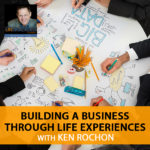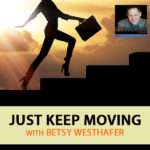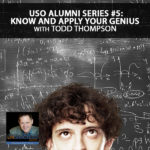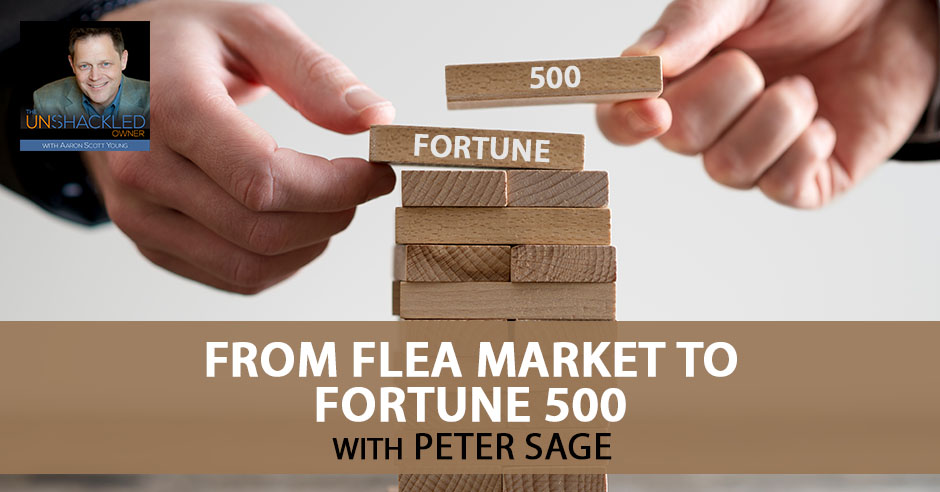
—
Listen To The Episode Here
From Flea Market To Fortune 500 with Peter Sage
I’m excited to have with me Peter Sage from Central England. Many of us Americans feel like if it’s England, it’s got to be London. He lives a couple of hundred miles away from London in the same part of the country. I made a choice a long time ago to get out of the big cities and get out into the country where I could get a little sanity because we spend plenty of time out. Peter is the owner and the Director of Sage Academy, which works with smaller business owners and also some of the biggest brands in the world. He’s spoken all over the place, have done four TED Talks, he has spoken for NASA and all kinds of things. Peter’s got a great slant on how to become wildly successful, productive, engaged and be able to be the leader that you want to be. I was delighted that we could have him on. There were few missteps trying to get our schedules together because we’re across the whole United States and the Atlantic Ocean, eight to nine hours. Peter, I welcome you to the program. Thanks so much for being here.
It’s an absolute pleasure. I’m delighted we managed to connect.
Let’s start right off where I like to start with people. Tell me briefly about your childhood. What about mom and dad? What was the situation you found yourself in as a kid?
I had a childhood that I couldn’t complain about. I have two functional parents. I was the only child. They loved me. There were no issues. We were born not wealthy. I was born on a low-cost housing estate. There was no silver spoon, but it meant we had traditional values. One of the interesting things that I learned in hindsight looking back was my dad was a rough mobster gangster guy. Rough and ready, what we used to call ODC; ordinary decent criminals. My mother was a trainee nun. She ended up being a special minister for the Catholic Church. What I learned about that vicariously through growing up and not realizing until later was it taught me a huge amount of tolerance for understanding different models of the world.
My dad was an atheist and he would not tolerate any imposition of religion or anything like that. He didn’t believe it. It was all BS. He thought it would be perfectly okay for my mom to put religious stuff around the house and, she used to call them the God squad, have all of her friends come over and do whatever they did. You had these two seemingly diametrically opposed models of the world, living in perfect harmony by not imposing their own judgments on each other. Growing up as a kid of that, it taught me that you can live and let live rather than tearing the heart out of the throat of somebody that disagrees with you. I had quite a placid and general great little childhood upbringing. We upsized and my dad did pretty well and we bought our own home somewhere else and had a big back garden to play in. I made friends and loved dogs. That was my childhood. I have no negative memories of my childhood.
I’m not looking for the negatives. There are things that shape us in our life. I think because you went right to that place, it’s super interesting. I grew up in a home that was a conservative religious home. For as much as we thought we’re doing these righteous things, there was a tremendous amount of judgment. You’re looking at other people against measuring the yardstick of your life and the, “Isn’t it too bad that they’re doing this? That’s bad or aren’t they wonderful and righteous?” As I got older, I came to realize that the little microcosm of my life and my social group, my church and so on wasn’t reflective of the world on a big scale. You learned from a young age that people with different opinions can get along, can build a life, can love each other.
I know we don’t know each other very well. We’re getting to know each other. This is a conversational podcast and I want to say that it took me 50 years to finally make a break with the conservatism that I’d been raised in. To be able to unashamedly embrace what you learned from childhood. It doesn’t surprise me at all that you work well on an international stage because you don’t have a lot of hang-ups about people that are different than you. Tell me about that. How has that impacted you as you grew up?
One of the things that I’ve come to understand is underneath, we’re all made of the same stuff. I know how you feel when you feel happy based on how I feel when I feel happy. I know how you feel when you feel stressed and I know how I feel when I feel stressed. The only thing that clouds that is a projection of individual models of the world that are addicted to being right. Being right and being happier are two completely different things. Think about it. Why would you expect anybody to even possibly agree with you if it didn’t fit their pictures? Why would it fit their pictures if they’re not you?

Fortune 500: Being right and being happier are two completely different things.
You see the turmoil all around the world because of people who say, “My way is the right way.”
It may be the right way for them but you’ve got no right to impose that on a billion other people.
It significantly impacts your ability from a business perspective. This show is about business, but it’s more about leadership, ownership and seeing the world from different perspectives. It’s all related back to business but for business owners. This isn’t going to benefit a lot of people who are employees of another company. As owners, the people that I’ve met that have the greatest level of success don’t block out lots of other people, their ideas and their opinions, because you lose touch with the market. You lose touch with everybody that doesn’t think like you. It impresses me that you went immediately to a rough and ready dad. It’s a last-minute decision, not a nun. The good girls fall for the bad boys and they got together and they provided a great life for you. You’re a young man. You’re growing up in this non-judgmental family. What was your scholastic experience? What did you do? Did you go all the way through university? What was your path?
I’m wondering, you talked about the patterns that shape us. There’s one very defining moment. We only learned this in hindsight when I started becoming an expert in human behavior and following the path that took me on for the last 30 years. One of the patterns that shaped me so strongly was when I was ten years old, my parents say they were working class, but they worked super hard to put me through private education. I didn’t go to school with my next-door neighbors that were at the local state school. I went to private school and at ten years old I was at Leicester Grammar. My mom turns around and says, “We need to have a conversation because the schools put the fees up. We can’t afford it and I’m willing to take another job in the evenings to pay for your school but it means you won’t see me. The alternative is you go into the state school system but at that point, you’re going to lose your guarantee of a university education because the teachers aren’t going to push you. You’re there to fight for yourself.”
Of course at ten years old, I want to see my mom. I say no problem. I’ll go to the state school. What happened is during the summer holidays in between me going from the guaranteed high-end private education into the state lottery system school. My mother, out of fear of losing her child’s guaranteed university path and out of love for her son but not knowing what the consequences of our actions were, she essentially spent those eight weeks in the summer holiday drilling into me every single day things like, “You have to work hard when you get to this new school, otherwise you’ll end up emptying the dustbins of the people you were at school with in the private school.” It’s basically scaring me to death thinking that if I didn’t work hard, I was going to spend my life on a park bench. From that moment on at ten years old looking back, everything that I did, I became a classic overachiever. It was basically enhancing the fear that I wouldn’t be good enough, which is the primary human fear we all have, the fear that we’re not enough, which ultimately means we wouldn’t be loved.
For me at ten years old, I go into the state school system that ironically I’m not very academic. I actually left school at sixteen. I have no formal qualifications. I couldn’t spell MBA. For me, I was out of there as fast as I could, but everything I did in life from joining the army cadets and becoming the youngest ever instructor in the history of the cadet force to this day, from being attaché to the Queen at sixteen years old, from being a national shooting champion, making my first million in business at 22. Everything that I did at that point was a classic overachiever and it was all about covering up the insecurities as a young man as to the fear of not being enough. It wasn’t until later in life that I saw that because I suffered from a disease that most CEOs I meet suffer from, which is confusing a lifetime of chasing success for a lifetime of chasing fulfillments. I was wildly successful. I bought my first Ferrari for cash at 25. I built dozens of companies since then internationally all over the world but I was miserable as hell.
I was stressed out of my mind working 130 hours a week running eight companies simultaneously at that age. What happened was I drive home one night, leaving the office at 2:00 in the morning as usual to get with my three and a half hours sleep to get up to get in for 6:00 AM. I fall asleep and hit an intersection at 60 miles an hour. That will wake you up in more than one way. Luckily, I wasn’t hurt too badly. The car wasn’t very happy, but it taught me a lesson. What am I doing here? I’m chasing a rabbit that I can’t catch by design. If you’re chasing the rabbit of fulfillment by running on the track of achievement, the two are mutually exclusive and it’s going to take a long time to learn it.
It’s a brilliant thing that achievement and fulfillment are not necessarily connected. This is not nearly as eloquent as what you said, but I learned long ago that money doesn’t make you happy, but money makes you happier. If you’re already happy and you have money, you’ll have an even better time. If you have money and you don’t have relationships, you don’t have health, you don’t have all that, the money doesn’t matter at all.
Money is a magnifier. If you’re an idiot, money is going to make you a bigger idiot. If you’re generous, money will make you more generous. It’s just a magnifier of options because it enhances your decision space. You’ve got more decisions with respect to the person that you were originally without the money.
I want to go back to 22 years old. You made your first million at 22. I don’t know if you meant you put a million in your pocket or built your first million-dollar company or what that meant. You left school at sixteen. Almost everybody that I’ve interviewed on this program, maybe they have a Bachelor’s degree, very few of them have any higher education, Master’s or Doctorates or anything like that. Most of the successful business people, 80% of billionaires didn’t finish college. Many of them didn’t start college.
I never suffered the disadvantage of college.

Fortune 500: Part of the idea about being unshackled is that you can’t do it by yourself.
Me neither. You dropped out of school at sixteen. You were doing these other things in your late teens but somewhere in there you started your first productive, making real money business. What was that business?
The first business I started at seventeen was selling toys. I worked for my dad for a short while at sixteen and I learned a big lesson there that you should never work for your parents because they don’t pay you enough. I was earning £40 a week. This was 1988, 1989 but £40 a week is still not good money. I remember turning around to my dad and I said, “I’m leaving at the end of the week.” He said, “Why?” I say, “I’m a great believer that if you jump in the deep end, you can only swim and my destiny is not to work in a junkyard,” which is what he owned. He only had two members of staff. He could have owned his own job when he was giving sympathy sum for sum trying to earn some money rather than be homeless. I took that last £40 and I looked around at opportunities and I thought nobody’s selling kid’s toys on flea markets and in car boot sales and things. I blocked my way into wholesalers. I bought £15 of the toys. I paid my mom £10 on board. I paid my friend £10 that I owed him and I had my last £20 to my name.
I bought £15 of the toys and I remember driving to a field on a Sunday in a little Mini. I pulled up at this field, I wind the window down and I hand my last £5 through the window to the field owner to go and sell my stuff. I remember I didn’t have a table. I couldn’t afford one. I had a blanket and I put my toys on the blanket and I sold my £15 of the toys for £30. I went back the next week and I bought £25 for the toys. My mom gave me credit on board because she says I was doing something. I passed my last £5 through the window and I sold the lot for £50 and I built up and up over four, five, six-week period. I’ve got enough to cover a market stall and then I started markets and Sunday markets and toy parties and things. I left my dad in June and I remember by October, I’d made my first thousand. I was so excited because I’d made it and I’ve not earned it. There was a massive difference for me because that means I could always make it and I wasn’t relying on somebody else to pay me that I didn’t know, that could stop the business tomorrow and make the wrong decision or downsize and I’d always be okay. That was a mercy thing.
You built the toy business up. I started my first company with a payroll at eighteen, almost nineteen. I have to say I was older than you. That was the first time I had employees and that was a weird shift. Part of the idea about being unshackled is that you can’t do it by yourself. You can’t do it on your own. At some point, you left the market stall of selling toys and you started your first business where you were employing other, maybe with the toy business.
I cashed in at Christmas on the demand for toys. I wrote a book at that point and self-published it. That was my next business in mail order. My first major business that has a turnover of a million was a casting agency and that’s when I started employing people. This was ‘95 because Windows 95 had just come out. It was the first time in history that human race could store, retrieve and share data en masse. I employed people for the first time probably age 21 and that was a big thing for me at the time, it was very different. I was a complete jerk to work for in my first early days because it was all about me and you have to get the business right. Otherwise, ultimately I wouldn’t be good enough if the business failed. There’s a fear-based controlling mentality, which still I see a lot of CEOs have rather than understand that if you treat your staff right, they’ll do anything for you.
I want to point out to the audience. Here, we’ve covered a span of 16 to 21 to 22, not very many years. This is the time when most of us are in high school, maybe dinking around in college. Maybe if you stayed on point, didn’t change your major, now you’re getting out of college at 22. In that same time, Peter had his first real venture into entrepreneurship with the toys, written a book, and started a casting agency. The jump from toy sales on a blanket to writing a book to a casting company, getting entertainers together for whatever reason and being able to do revenues up in the seven figures, that’s so interesting and so entrepreneurial. For most people that go onto university, they get on a track. They say, “I think I want to be this whatever,” fill in the blank title. “I have to take these classes and get these certificates and have these activities so I can get my piece of paper so I can go get a job to do this whatever.”
Entrepreneurs are not like that folks and I want to make this point super clear because Peter is doing a phenomenal job of illuminating this. Some people want to force themselves to be entrepreneurial. They decided that it’s cool and so they want to do it, and then most of them beat their heads against the wall for years because they’ve come up with some idea or a book or whatever and they think they are in love with it and they want to force it down the throats of other people. The reality is the market. If you’re having to force this and you’re not making any money, odds are you’re doing something wrong.
Nobody wants that thing that you have decided is so cool. Entrepreneurs look for opportunities. Peter said at sixteen, “I looked around and nobody was selling toys at the flea markets, at the Sunday markets.” He said boot sales. I hope you guys understand that means the trunk of your car. It’s selling out of your car. The point is he looked where there is a need. He looked at it from the point of view of a kid. “Who’s selling toys? Nobody’s selling toys. I’ll go sell toys.” The first lesson from Peter Sage is all about accepting and loving each other and finding ways to work in harmony. The second one that I’m picking up is great entrepreneurs look for opportunities. They don’t try to force their thing onto somebody else. They go, “Where’s their need and why not me? Somebody is going to fill their need. Why not me?” Peter Sage didn’t know at 21 years old that he was probably too young to have a casting company. Maybe people in the business wouldn’t take him seriously. Maybe it would be an uphill battle because he was an entrepreneur. He saw that there’s an opportunity. “I may as well do it.” Is that true, Peter?
Absolutely bang on, completely. For me, it’s funny because I have to have a chairman’s voice on the phone because at 22 I actually looked twelve. When people would meet me, it was a standing joke. I had a casting director that was 50 years old. He’s been in the industry a lot that I was employing and we’d walk. We’d go to meetings together and they’d walk up and shake hands with him and say, “Mr. Sage, it’s nice to meet you.” It was a standing joke, “No, this is Mr. Sage,” and he’s introducing a kid that just pulled up in a sports car. That was fun. I saw an opportunity in the market because prior to that, database casting didn’t exist because there was no Windows 95. There was no ability to do database for the average person.

Fortune 500: Train your people so that they can be your competition, but treat them well enough so that they’d never want to leave.
Prior to that, there was a book called Spotlight where actors or filmmakers will have their pictures taken like their portfolio and put into the industry book like Encyclopedia or the Catalog for the year. Casting directors would flick through it or look in filing cabinets to find who they needed. Sorry, but welcome to the twentieth century at that point. Eight clicks of the mouse later, I can have who you need and I’m going to flip through a filing cabinet and it just seemed the logical thing. I knew nothing about the film industry. Why would I need to know about the film industry when I can hire a good casting director? I’ve been in all different industries since then. Virtually none of them are related and virtually everyone I know absolutely nothing about. My job isn’t to know about an industry. I hire in expertise. My job is to fulfill opportunities in the market. That’s what entrepreneurs do. That’s what we’re born for.
Lesson number three. There’s another excellent lesson right there. If you know what you’re great at, Peter may not have been able to know it consciously to say it to other people, but he was seeing opportunities in a very organic way. Maybe that’s true, Peter. Maybe you didn’t acknowledge that as a kid as a superpower or something unique. All you knew is that you knew how to see opportunities. Folks, let me remind you of this thing that I’ve learned over my career and Peter just said it and now you’re getting it from two continents or at least from an island and from a continent. Here’s the deal. A lot of times you’ll be afraid to hire in somebody smarter than you or more connected than you, somebody who already knows about this thing that you’re getting involved in because you think, “If I hire them and elevate them in some way, maybe they’ll steal my idea.”
The fact is people don’t steal your ideas. Even if they do try, they almost always fail. There’s some gene, some part of your DNA if you’re a real entrepreneur, that is a leader. Almost nobody who’s good at doing some task is necessarily a good leader. If you can get over this fear of, “If I hire people smarter than me, somehow I’ll lose control,” listen to what Peter Sage just said. You can always hire the expertise and that person who’s an expert, they don’t know how to do the business part. Is that true, Peter? They’re not going to steal your thing because they have no clue how to go forward with it as a business.
I learned this from Richard Branson and I’ve been very blessed to share the stage with Branson a few times. One of the best lessons I learned from him is like, “Train your people so that they can be your competition, but treat them well enough so that they’d never want to leave.” There’s a difference between being an employee and an entrepreneur. You talk about the biggest lesson for me was understanding the defining characteristic here we’re talking about is not a skill set. It’s not about training them good enough to be a business person. You have to understand that the defining characteristic of an entrepreneur is the ability to handle uncertainty. If these people are trained exceptionally well in one particular area, that doesn’t qualify them to handle the uncertainty of business. Just because you know how to do the technical work of a business does not qualify you to run a business that does that technical work.
You mentioned that about your dad early on. You said that his scrapyard or junkyard was as he was self-employed. He owned a job is I think the way you said it. I read an interesting study that said the median income for a self-proclaimed entrepreneur was $25,000. The reason from my perspective is that most of the people who are trying to be entrepreneurs are self-employed and they haven’t figured out a way to get enough money per hour or per toy or per scrap piece of metal to make a real living. Of the United States’ 22 million companies, only 28,000 of 22 million exceed the $10 million mark in revenue. It’s a tiny fraction of all those people who are selling multilevel marketing stuff. They’re trying to be a coach, trying to mow lawns or whatever they do.
The difference between that self-employed person who may be struggling and an entrepreneur who reaches the heights, as we described, multiple TED Talks, being on the stage with Richard Branson, buying a Ferrari for cash at 25. The difference is the ability to see opportunity and not just, “I’m sick of doing the work for somebody else.” Seeing an opportunity in the market like there’s nobody selling toys and the ability to deal with the ups and downs. Peter, have you had a nonstop positive trajectory your whole time where you’ve just gone up or had there been ups and downs?
Show me a person that had a straight line up and I’ll show you somebody who’s on drugs. I’ve probably failed more times than I’ve won. I just keep my average number and tries up.
Richard Branson, you remembered him. He said hundreds of joint ventures or Virgin projects didn’t work. He writes about it. You have a few that worked great. It’s part of the game. It’s that ability to deal with adversity or to deal with the complexity and uncertainty.
Draw the parallel in dating. Most people don’t start a business because they’re afraid of failure. That’s like saying, “I’m never going to ask out a girl in case she says no.” What if I told you that the fifth girl that you’ll ask out is the one that’s going to be your soul mate? You’re either going to say, “I’m going to be lonely for my whole life because I can’t deal with four levels of rejection,” or “How fast can I get the number five?” That’s the attitude of entrepreneurs. We don’t feel lonely when it comes to stuff like that.
This is the thing about entrepreneurs I’ve noticed. You can go out, start a business, it’s working, you’re sailing long, you’re flying. You’re looking out the window over here, the jet and you go, “The engine’s on fire. That’s okay. I’m going to ignore that for a while because this one’s still working over here.” Then pretty soon that one’s gone out too. You go, “I can probably glide for a while.” Then about the time that we’re going to crash and explode into the ground, we’re having lunch with our friend going, “I’ve got this new idea. I’ve got this new thing I’m going to do.” Isn’t that true?
That’s the entrepreneurial spirit. What stifles us a lot of the time is when we get into the management of the aircraft mode rather than, “I’m the guy that built the plane and I’m flying around the world,” mode. It’s required, but it’s also can be hired in a lot. I’m a lousy CEO. I openly admit it. I’m not a detail-oriented, process-oriented, operations-oriented guy. I’m a visionary. I’m the guy that will bet his house on a deal. I don’t want to hire a CEO that wants to bet his house on the deal. I want to hire a CEO that’s done his homework and run the spreadsheets and makes a rational decision following my vision. There’s a difference between the categories and skill sets, but if you get too much into the maintenance, the biggest challenge I see with a lot of business owners is they’re chasing that rabbit of fulfillment on the track of achievement because they’re too scared of failure because they don’t know what it means.
Here’s the fun fact. I see this as a scenario that’s so common but isn’t verbalized upfront. You get all of these people that say, “I’m going to spend the next fifteen years of my life ruining my relationship, sacrificing my health, distancing myself from my kids, so that hopefully, at the end of that rainbow, I’ve earned enough money to pay for my divorce, to hire a personal trainer that can give me my health back, and I can buy my kids a lot of stuff so they’ll love me again.” That’s not the conversation that happens at the beginning, but that’s the reality of how so many people go through it because they missed the fact that happiness is a now experience. If you can’t enjoy building the business and enjoy the time the engine’s on fire and enjoy the time and ride the waves and you’re there just because you want the blue sky to be there and the fuel tank to be full, it isn’t going to happen. Embracing that level of uncertainty is the defining characteristic of successful entrepreneurs. It’s not having a straight trajectory up. You don’t learn anything when the sun’s out. You learn stuff when the engine’s on fire.

Fortune 500: The strongest trees grow in the strongest winds, not the best soil.
I’ve sat with the CEO, he’s a Harvard Business School graduate. I’m not going to go into detail right now about some of his accomplishments, but he’s very accomplished. He was frustrated over a new project and things weren’t working out. He was talking about it and he was frustrated and going, “I wonder if I should have even tried this.” I said, “Never forget this. Listen to the conversation that we’re having. No matter what the outcome is right now, you’re in the game. You’re not sitting on the sidelines. You’re not showing up and clocking in for somebody else. You’re not in a cubicle. You’ve got this huge life that you’ve lived and had lots of success. Right now this project, even if it’s not going well, you’re a player and you’re playing at a high level so be excited about it, be curious.” What are we learning right now? Who am I meeting? How can I become a different person so I can solve the problem? The excitement’s never in the smooth sailing and the learning is always in the challenge.
The strongest trees grow in the strongest winds, not the best soil.
I’m just going to take all your quotes after this and write them down and make a bunch of quote cards for you.
Feel free to steal whatever you want.
You get credit. You just have a bunch of great things that you say and I love it. It’s interesting because the more we’re talking, I know you may not see this. You and I are quite like-minded. We’ve built businesses. We’ve built wealth. I think I’m older than you because I’m 54. Based on the timelines you’re telling me, I’m older than you. At about 50 years old, my life was under control and it was time to start teaching some of the things that I’ve learned, which I’d never done before. I’d always been nose to the grindstone, building businesses, selling businesses, keeping businesses, but I wasn’t trying to serve my own cooking to other people.
The more I’m listening to you, the more I’m realizing we’ve had at least somewhat of a parallel path of starting young. You had mom and dad that loved each other. People have asked me, “What was one of your big benefits?” I said, “I was born into a modest home, but my parents stayed together and loved each other and made me feel like I could accomplish whatever I wanted.” That’s one of the great gifts we can get. Some people think, “I came from the streets, nobody loved me. I was an orphan at two and I clawed my way out and I built this mega empire.” That’s a different motivation. I’m enjoying listening to you because I rarely run into somebody who’s had any similar path and made choices. Here you are now and if people go to your website, which is PeterSage.com, they can learn a lot about you and see what you’ve done, watch the video and so on. What would you say is most exciting about where you are now and what are you looking forward to in 2019 and over these next few years?
It’s focusing on the niche, which is a new area I’m putting my attention to. Taking those high level of burnt out, stressed out, borderline depressed, pulling their hair out, whatever’s left of it, executives, CEOs, senior vice presidents, and teaching them how to get that life back. How do you become the person that you thought you were going to become at the end of the rainbow now? You’re not staring at the ceiling at 3:00, you’re not emotionally unavailable to your partner because you’re exhausted, so they’re having an affair. You’re driving the car that you want to drive, but you got to the top of success mountain or what you thought was there and now you want to jump off because you’re not happy. How do you turn that around and give them their life back? That’s where I come in.
I’m the guy to call at that point because that’s the path I’ve walked. You compound that with now 30 years. This year I’m 46 and I got into personal development at sixteen to seventeen. That’s 30 years this year in understanding personal growth and I spent fifteen years as a trainer with Tony Robbins. Understanding people is what I do and knowing how to get people through that is where I’m at. I’m excited to add a lot of value around that. The book that I released last year has changed the lives of every single person who has read it. It’s a very unique book and I’m very proud of that but I want to write my next one, which is going to be called Earth School. How to understand and have a context for understanding adversity and why it shows up and how to deal with it in a more empowering way. How to celebrate the engine fires rather than panic. That’s where I see myself going this year. I’m moving out to the Canary Islands in a few weeks because I’m a sunshine freak. I spent six years in Dubai. England’s national color is gray. I don’t want to stay here anymore. I’m excited about 2019 and what’s going on.
You’re moving to the Canary Islands?
Yes, just off the West Coast of Africa, Tenerife, Gran Canaria.
The reason that surprises me is that with this much teaching and training you do, you’ve got to fly.
There’s a bunny hop aspect to that, which will be Madrid or Barcelona, maybe Lisbon, Heathrow if I have to go back North. It makes such a difference waking up every day in the sunshine to me. I’m a weather guy. If you’re living in a time in human history and you can choose where you want to live, would you choose where you are? That’s an empowering question.
We’re empty nesters now, my wife and I. Our youngest is twenty. He’s in a university in Japan. The other kids are all married. I’ve got four grandkids now. The two oldest got married. The third one’s serious. He’s down making music videos in LA. My wife and I of 32 years are empty nesters. We live in Washington State, very close to Portland, Oregon. In the lower 48 states, that’s as Northwest as you can get. We’re known for our beautiful mountains, but we live in a temperate rain forest and this time of year, it’s gray and raining very much like England.
We looked at buying a house down in Central Mexico, San Miguel de Allende, a couple of years ago. The deal didn’t come together and we said, “It’s too far from an airport.” It’s three hours from Mexico City. Then we talked about there are a lot of tax advantages in Puerto Rico right now. Maybe we should spend a substantive part of our life in Puerto Rico and get the benefit of residency in Puerto Rico. It’s still part of the United States but it’s got a great tax rate for US citizens. Our biggest hang-up has been our grandkids. They are here in the Northwest. It’s been an interesting thing. When you said that, I totally relate that you wanted to get the sun because when you come from a gray, rainy place half the year, you want the sun. It’s one of those interesting things about I’ve wondered if I have the courage to utterly change the life. You went to Leicester Grammar, you said?
Leicester Grammar was where I went to school.
Do you still live in Leicester?
I’ve lived all over the world. I’ve been back in England for the last two and a half years. I was in Dubai for six years. I was in Vancouver, BC for three years, the Channel Islands for five years. As you say, it’s one thing waking up when it’s gray and rainy in winter, but it’s gray and rainy in summer in England. Our national color is gray. I need to get out of here.
I wanted to give you a little time to think about those other questions. I wanted to be transparent and people have asked me about why we stay. We live on a great little farm up in Washington. We raise horses, goats and chickens and it’s a wonderful life, but every time I land in San Diego, California, I think, “Why don’t I live here? This is fantastic.” When you said it, it brought all this emotion out of me. Tell us about the book that’s changed everybody’s life and then any parting words you can give to the audience.
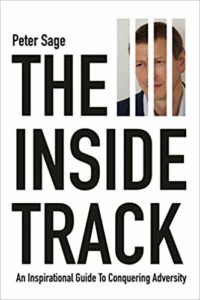
The Inside Track: An Inspirational Guide to Conquering Adversity
The Inside Track is the book and I know we didn’t get into it, but it’s a fascinating story. I was building businesses and doing what I do and then I found myself in a civil action against a multibillion-dollar company over a multimillion-dollar deal we’ve done years before. I didn’t see it coming. I completely underestimated what I thought was a chess move, which was a contempt of court application. It didn’t give it credence because I thought the judge would laugh it out in court in five minutes. They ended up selling it to the judge and I ended up doing six months as a noncriminal in Britain’s toughest jail a few years ago. I lost my business. I lost everything. It was a real couple of engine fires and hard landings. I had one of the most incredible adventures I’ve ever had the privilege of living by going in there not as the identity of a prisoner, but as a secret agent of change. I thought if the universe wants to send me into a place where people never normally get to see my work to help them, then let me go do it.
I ended up winning national awards, stopping people on committing suicide, getting off drugs. The Inside Track is a very unique book. I didn’t write it afterwards. This is the actual eleven letters that I wrote to some of my high-end coaching clients throughout that experience telling them how I was dealing with what I was dealing with and how I could walk into a place like that, losing everything and still smiling and making a massive difference and turning everything around. Since then changing the system which is now affecting thousands of prisoners every month. That’s the book and it’s literally a how-to manual on how to become your best when life gives you its worst. I’m very proud of it, but it was never meant to be a book. I came out and all of my students said that they learned more out of the letters than they did out of my seminars in the last few years, I must release it to the public and so I did. The reviews have been absolutely incredible. You can get it on Amazon, Audible, Kindle, iBooks, we have hardbacks, softbacks, whatever. I’m very humbled by the fact that that book has had such an impact on everybody that’s read it at this level. Feel free to go and have a look. It’s not expensive. It’s just trying to reach more people.
Another thing we have in common, battle with the government. Finally, after $2 million in legal fees, gave up, was sentenced to eighteen months in federal prison for something they said I either knew or should have known, nothing I did. They said part of a conspiracy charge, which they admitted to me afterwards. They said, “We know you didn’t know what was going on but you were still legally guilty and we’re trying to make a big statement.”
Let alone about how the system works.
I think we’re excited to have met my twin brother from England. I hope that’s not too presumptive to say, but I’m amazed by the similarities that are coming out. Last words to everybody?
When it comes to building a business, make sure you understand the distinction between chasing success and chasing fulfillments. Don’t put everything off thinking there’s some magical day you’re going to be happier if fill in the blank. No, you either enjoy the ride right now, knowing the ups and the downs, and everything that’s part of the game. Embrace the ride. Go swing the bat. Don’t let anybody ever tell you, you can’t and go live your dream.
It’s great counsel from a man who’s had tremendous life experience. Peter, thank you so much for being here. I’m grateful to have had you. Folks, this is what I’m getting. Peter and I did our first conversation. I’m going to recount what I have seen. The similarities between virtually every successful person I’ve ever met, ever worked with, ever been able to talk to is they see opportunity and they seize that opportunity. They stay curious even through the difficulties, even through the challenges, even through things that you never saw on your path. When Peter said he did his dream board, I’m positive prison was not part of his dream board. He never saw himself behind bars, but you stay curious and you stay productive. Don’t let the trials of life beat you down or make you angry, cankered, and bitter toward the system, bitter toward the world. Just say, “What can I do? How can I grow where I’ve been planted at this point in my life?”
Then living in different places and doing business in different places, you can’t help but be exposed to other ways of thinking, other ways of doing, other creative people who see the world differently than you. When we start to adopt lots of ideas, when we start to learn lots of processes, lots of needs, if we start to see these things, we connect the dots. If you remember Steve Jobs, one commencement address that he gave at Stanford. He said, “Entrepreneurship is all about connecting dots. The more dots you have in your universe, the more likely it is that you’ll get the success that you want.” We’ve been taught seriously at the feet of a master now. I’m super glad that we connected, Peter. I’m glad and I hope that we can meet face-to-face when you’re here or I’m over there. I hope you took great notes and write down these traits that will lead you to become an unshackled owner. I’ll look forward to seeing you again.
Important Links:
- Peter Sage
- Sage Academy
- PeterSage.com
- The Inside Track
- The Inside Track on Audible
- The Inside Track on Kindle
About Peter Sage
 Peter Sage is a well known international & serial entrepreneur, author, philosopher and teacher. His unique way of looking at and relating to life has inspired tens of thousands of people worldwide to Reinvent themselves. Whether by improving or turning around a business or developing a new and empowering psychology through practical yet profound shifts in awareness, Peter hopes his insights and teachings can offer something of value to those who seek it.
Peter Sage is a well known international & serial entrepreneur, author, philosopher and teacher. His unique way of looking at and relating to life has inspired tens of thousands of people worldwide to Reinvent themselves. Whether by improving or turning around a business or developing a new and empowering psychology through practical yet profound shifts in awareness, Peter hopes his insights and teachings can offer something of value to those who seek it.
- AaronScottYoung.com
- The Unshackled Owner Twitter
- The Unshackled Owner Facebook
- Aaron Scott Young LinkedIn

